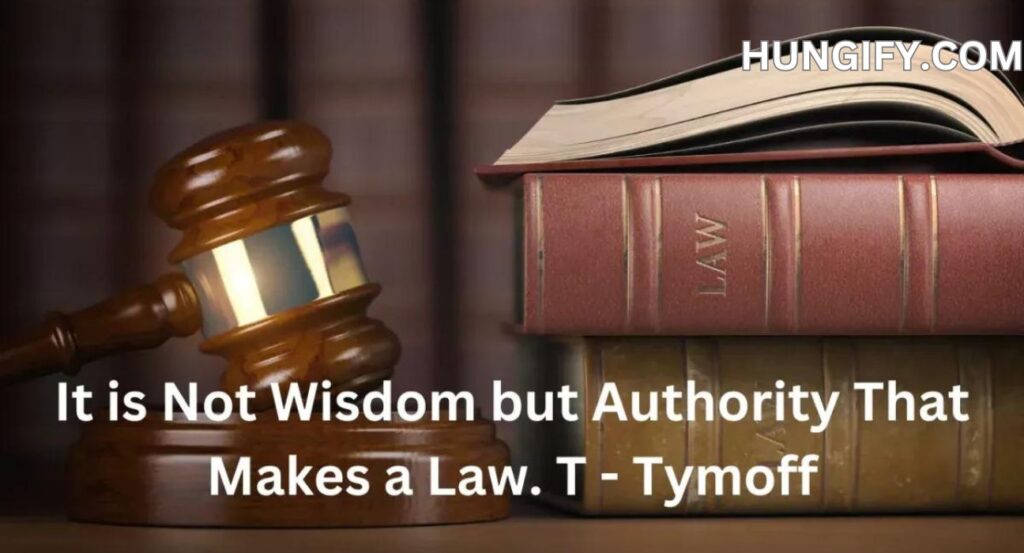Introduction
The phrase “It is not wisdom but authority that makes a law” by T – Tymoff underscores the influence of power over intellect in the creation of laws. This statement invites us to explore how authority shapes legislation, often overshadowing the wisdom that ideally should guide lawmaking. Understanding this dynamic helps us grasp the complexities of legal systems and their impact on society.
Read More: Pastor Chris Hodges Scandal
The Perception of Wisdom in Laws
Definition of Wisdom in Lawmaking
Wisdom in lawmaking involves using knowledge, experience, and ethical considerations to craft laws that promote justice and societal well-being. It seeks to reflect moral principles and collective values.
Historical Examples of Wisdom-Based Laws
Historically, wisdom has played a crucial role in lawmaking. The Code of Hammurabi and the principles of Confucianism exemplify how ancient civilizations incorporated wisdom to ensure fairness and justice. These laws emphasized moral integrity and societal harmony.
Authority’s Role in Legislation
Definition of Authority in Lawmaking
Authority in lawmaking refers to the power vested in individuals or institutions to create, enforce, and interpret laws. This power often derives from political, social, or economic dominance.
Historical Examples of Authority-Based Laws
Authority-driven laws, such as those in authoritarian regimes, often prioritize control over ethical considerations. The laws during the Roman Empire and more recent examples like apartheid in South Africa demonstrate how authority can dominate the legal landscape, sometimes at the expense of justice.
The Impact on Society
How Authority-Based Laws Shape Societal Structures
Authority-based laws can significantly shape societal structures by imposing strict regulations and maintaining order. These laws can lead to stability but may also result in the suppression of individual freedoms and rights.
Case Studies of Authority’s Impact
The enforcement of Jim Crow laws in the United States and the implementation of martial law in various countries illustrate the profound impact of authority-driven legislation. These laws often reflect the interests of those in power rather than the broader societal good.
The Intersection of Wisdom and Authority
Balancing Wisdom and Authority in Lawmaking
A balanced approach to lawmaking integrates both wisdom and authority. This balance ensures that laws are enforceable while also being just and equitable.
Examples of Successful Integration
Countries like Sweden and Canada exemplify successful integration of wisdom and authority. Their legal systems incorporate ethical considerations and democratic principles, resulting in laws that are both fair and effective.
Empowering Change
Role of Public Participation
Public participation in the legislative process is crucial for ensuring that laws reflect collective wisdom. Mechanisms like public consultations and referendums allow citizens to contribute to lawmaking, promoting transparency and accountability.
Mechanisms for Ensuring Equitable Laws
Implementing checks and balances, such as judicial reviews and independent oversight bodies, helps ensure that laws serve the public interest and prevent the abuse of authority.
Legal Authority in Democratic Societies
Role of Elected Officials
In democratic societies, elected officials hold the authority to make laws. These officials, ideally, represent the will of the people, though political agendas and lobbying often influence their decisions.
Influence of Political Agendas
Political agendas can shape the legislative process, sometimes leading to laws that reflect partisan interests rather than the common good. This influence underscores the need for vigilance and active public engagement in democratic governance.

Challenges of Authority-Driven Laws
Risks of Power Concentration
Concentrating power in the hands of a few can lead to the abuse of authority. This risk is evident in totalitarian regimes where laws often serve to entrench the power of the ruling elite.
Historical Misuses of Authority
Historical instances, such as the laws under Stalin’s regime in the Soviet Union, show how unchecked authority can result in widespread oppression and injustice.
Benefits of Wisdom-Influenced Laws
Long-Term Societal Benefits
Wisdom-influenced laws often yield long-term benefits by promoting justice, equality, and societal well-being. These laws consider the broader impact on society and aim to foster harmony and prosperity.
Examples of Progressive Legal Frameworks
The progressive social policies in Nordic countries, which focus on welfare and equality, highlight the benefits of incorporating wisdom into lawmaking. These policies contribute to high standards of living and social cohesion.
The Role of Judiciary in Law-Making
Interpretation and Application of Laws
Judiciaries play a critical role in interpreting and applying laws, ensuring they align with constitutional principles and societal values. Judges use their wisdom to navigate complex legal issues and deliver fair judgments.
Ensuring Justice Through Judicial Wisdom
Judicial decisions, based on accumulated wisdom and legal precedents, help maintain consistency and fairness in the legal system. This judicial oversight is essential for preventing the arbitrary exercise of authority.
Public Perception and Acceptance of Laws
Importance of Public Support
Public support is crucial for the effective implementation of laws. Laws perceived as just and fair are more likely to gain acceptance and compliance from the populace.
Consequences of Perceived Unjust Laws
Laws that are seen as unjust or oppressive can lead to social unrest and resistance. Ensuring that laws reflect collective wisdom and ethical considerations helps maintain public trust and social stability.
Case Studies of Controversial Laws
Prohibition in the United States
The Prohibition era in the United States serves as a case study of authority-driven lawmaking. The ban on alcohol, enforced without broad public support, led to widespread non-compliance and the growth of illegal activities.
Apartheid Laws in South Africa
Apartheid laws in South Africa, driven by racial authority, resulted in profound social injustice and international condemnation. These laws highlight the dangers of authority devoid of ethical considerations.
Philosophical Perspectives on Law and Authority
Views of Plato, Hobbes, and Rousseau
Philosophers like Plato, Hobbes, and Rousseau have explored the relationship between authority and wisdom in law. Plato emphasized the role of philosopher-kings, Hobbes advocated for strong sovereign authority, and Rousseau promoted the concept of the general will.
Contemporary Debates
Contemporary debates continue to explore the balance between authority and wisdom in lawmaking. The ongoing discourse emphasizes the need for laws that are both enforceable and just.
Conclusion
The phrase “It is not wisdom but authority that makes a law” by T – Tymoff highlights the complex interplay between power and intellect in the legislative process. Understanding this dynamic is crucial for developing laws that are both effective and just, ensuring a legal framework that serves the common good. Balancing authority with wisdom remains an ongoing challenge in the quest for a fair and equitable society.
Read More: Do Alec and Kaleb Get Paid for Commercials?
Frequently Asked Questions
What does “It is not wisdom but authority that makes a law” mean?
This phrase suggests that the power to enforce and create laws is more significant than the wisdom or moral reasoning behind them.
Who is T – Tymoff?
T – Tymoff is an author or philosopher who has commented on the nature of law and authority, emphasizing the role of power in the creation of laws.
How does authority influence lawmaking?
Authority influences lawmaking by determining which rules are enforced and how they are applied, often prioritizing control and order over ethical considerations.
Why is wisdom important in lawmaking?
Wisdom is important in lawmaking because it ensures that laws are just, fair, and reflective of societal values and moral principles.
Can laws be effective without authority?
No, laws require authority to be enforced and to maintain order; without authority, laws lack the power to compel compliance.
What are some historical examples of authority-based laws?
Historical examples include the Roman Empire’s legal system and apartheid laws in South Africa, where authority played a crucial role in shaping and enforcing laws.
What are the risks of authority-driven laws?
Authority-driven laws can lead to the abuse of power, oppression, and the creation of laws that serve the interests of the powerful rather than the common good.
How can wisdom and authority be balanced in lawmaking?
Balancing wisdom and authority requires incorporating ethical considerations, public participation, and checks and balances to ensure laws are just and enforceable.
What role does public perception play in the effectiveness of laws?
Public perception is critical; laws seen as just and fair are more likely to gain compliance, while those viewed as unjust can lead to resistance and social unrest.
What are the philosophical perspectives on law and authority?
Philosophers like Plato, Hobbes, and Rousseau have debated the balance between wisdom and authority in law, highlighting the ongoing tension between moral principles and the need for enforceable rules.
